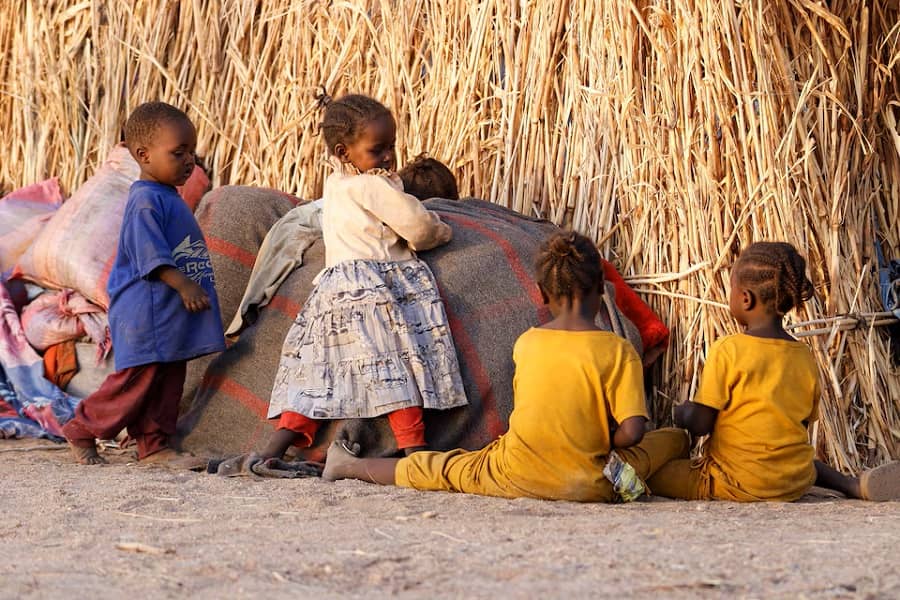As they endure the horrors of war and hunger, epidemics and diseases further exacerbate the suffering of Sudan’s children. Malnutrition has claimed the lives of thousands of young people across various cities and regions, particularly amid the suspension of humanitarian aid, which has led those stranded in Khartoum and displaced persons into catastrophic conditions. Additionally, young girls are subjected to sexual violence, rape, and early or forced marriage.
Reflecting the dire circumstances surrounding them due to the armed conflict, the Sudanese Doctors’ Preliminary Committee announced that 45,000 children have died from malnutrition since the outbreak of war in April 2023. Moreover, a child or two reportedly dies every hour in the Zamzam and Kalma camps in Darfur, and in Adré, Chad, which hosts hundreds of thousands of Sudanese refugees.
Government Efforts
In this context, Sudanese Health Minister Haitham Mohamed Ibrahim explained that “the rate of acute malnutrition among children has reached 15 percent, whereas a 6 percent rate requires hospitalization for treatment.”
He added that “the rise in malnutrition cases is not solely due to hunger, but also due to child illnesses, lack of access to clean water, and proper nutrition. Children in areas plagued by malnutrition often lack access to vaccinations, food, and healthcare services.”
Ibrahim announced that the Ministry of Health, in cooperation with UN agencies, has arranged a plan to combat malnutrition with a budget of $471 million, confirming the existence of 2,249 therapeutic and medical nutrition centers.
Catastrophic Conditions
Pediatric specialist Dr. Mohamed Mabrouk stated that “the absence of hospitals and health centers providing comprehensive care from pregnancy through to motherhood and childhood in conflict areas has contributed to the increase in cases and deaths. If the war continues, the humanitarian situation will descend into catastrophe.”
He noted that “there have been child deaths in displacement shelters far from healthcare facilities due to outbreaks of deadly diseases and a shortage of life-saving medications.”
Mabrouk urged the Sudanese Ministry of Health and international organizations to “take the crisis seriously and supply affected areas with medicine and food for children and pregnant women, especially those suffering due to sieges by armed groups.”
He explained that “some areas are experiencing the worst humanitarian conditions in terms of hunger, disease, and death, along with the collapse of the health sector and hospitals going out of service due to mutual shelling and the targeting of medical personnel.”
Victims of Poverty
Meanwhile, Secretary-General of the National Council for Childhood in Sudan, Abdelqader Al-Amin Abu, stated that “a significant percentage of children—up to 87 percent—live below the poverty line and have not received humanitarian assistance from the UN and its specialized agencies amid the war.”
He added that “of the 30 children handed over by the Sudanese army to the Red Cross, 13 were found to be suffering from severe malnutrition and dehydration, and had undergone traumatic experiences requiring medical care. They were handed over to Kassala state and are receiving special care.” Abu pledged that the council would continue following up on the issue of children of unknown parentage and do everything possible to support this vulnerable group.
Targeting and Assault
In areas of armed conflict in Sudan, young girls are experiencing sexual violence, rape, and early or forced marriage.
Social researcher Amani Al-Hassan stated that “sexual violence has been used as a weapon of war in the most degrading and exploitative ways. Displacement camps and shelters in safer states are home to hundreds of painful stories of psychological, physical, and sexual abuse endured by young girls during the conflict.”
Al-Hassan believes that fear for girls’ safety from conflict-related sexual violence has driven some families to marry off their daughters, making them silent victims of a harsh reality they did not choose.
She argued that “child marriage worsens societal issues in Sudan, as young girls are unable to bear the responsibilities of married life or adapt to family and interpersonal conflicts.”
She added, “Child marriage is a crime by all humanitarian, legal, and social standards. The impact of war has increased child marriage rates, particularly in conflict areas where families have been displaced from urban centers to camps without considering the consequences.”
Horrific Violations
In statistics revealing the scale of appalling human rights violations, UNICEF announced that “during the ongoing war in Sudan over the past two years, serious violations of children’s rights have increased by 1,000 percent,” urging the world not to abandon the millions of afflicted children.
UNICEF Executive Director Catherine Russell said in a statement that “two years of war and displacement have shattered the lives of millions of children across Sudan.”
The statement highlighted grave violations of children’s rights, including killings, maiming, abduction, forced recruitment, and sexual violence, noting that these violations “have increased by 1,000 percent over two years” and are widespread across the country.
The number of children killed or injured in Sudan rose from 150 confirmed cases in 2022 to approximately 2,776 cases in 2023 and 2024. Attacks on schools and hospitals also increased from 33 verified incidents in 2022 to 181 in the past two years.
Meanwhile, the number of children in need of humanitarian assistance has doubled over the past two years, rising from 7.8 million at the beginning of 2023 to more than 15 million children today, according to UNICEF.
